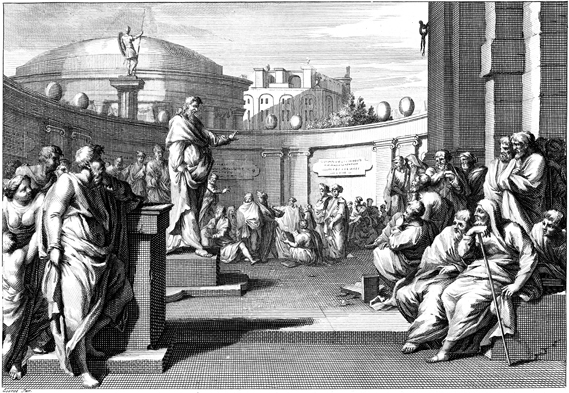 Live in an idolatrous culture? Depends on how we define idolatrous. (See https://theoldpreacher.com/idol-city/.)
Live in an idolatrous culture? Depends on how we define idolatrous. (See https://theoldpreacher.com/idol-city/.)
If the potential “idol” is necessary for our happiness, something we so desperately need we can’t imagine a fulfilled life without it (as J. D. Greear writes—see link above), then we’re hard-pressed to answer no.
First-century Athens had 30,000 idols (one per deity) though a highly-civilized Greek city of 10,000 people. Additionally they had at least one “to an unknown god”. (To be sure they offended none?)

Athens wasn’t on Paul’s “Must Preach At Cities” list. He was there waiting for Silas and Timothy to join him from Berea. Touring the famed city, “his spirit was provoked within him as he saw the city was full of idols” (Acts 17:16). So he “reasoned in the synagogue and in the marketplace with those who happened to be there” (Acts 17:17). According to Acts 17:18 he reasoned about “Jesus and the resurrection”—the living God as opposed to lifeless idols.
Among the “happened to be there” in the marketplace were Epicurean (pleasure the chief end of life, especially peace) and Stoic philosophers (man’s rationality and individual self-sufficiency primary). To both Paul was a “babbler” (Greek word used of scavenger birds, therefore came to be used of worthless loafers who picked up scraps of learning.) Others concluded he spoke of foreign gods (because he talked about Jesus and the resurrection).
“And they took him and brought him to the Areopagus . . . ” (Acts 17:19).
The Areopagus, or “Hill of Ares”, was the site of a council that served as an important legal institution under the Athenian democracy. This Council changed many times over the centuries. Originally, it was Athens’ central governing body; but under democracy it was primarily a court for serious crimes. Since Paul wasn’t charged with a crime, apparently on this occasion it met to formally consider Paul’s “philosophy.”
Very Religious (17:22,23, TEV)
Paul stood up in front of the city council and said, “I see that in every way you Athenians are very religious. For as I walked through your city and looked at the places where you worship, I found an altar on which it is written, ‘To an Unknown God.’ That which you worship, then, even though you do not know it, is what I now proclaim to you.”
A brilliant opening! (The Holy Spirit is known for his omniscience.) Paul had their attention.
With all our secularization talk, the U.S. remains a religious country. The Hartford Institute estimates (no official list exists) there are almost 315,000 “Christian” churches plus 12,000 non-Christian. Gallup reports 40% of the population claim to attend (most certainly an inflated figure). Nevertheless, even with our growing number of “nones”, we’re a religious people. We just have different idols.

Unknown God Known (17:24-28, TEV)
“God, who made the world and everything in it, is Lord of heaven and earth and does not live in temples made by human hands. Nor does he need anything that we can supply by working for him, since it is he himself who gives life and breath and everything else to everyone. From one human being he created all races of people and made them live throughout the whole earth. He himself fixed beforehand the exact times and the limits of the places where they would live. He did this so that they would look for him, and perhaps find him as they felt around for him. Yet God is actually not far from any one of us; as someone has said, “‘In him we live and move and exist.’ It is as some of your poets have said, “‘We too are his children.'”
“Let me tell you about that ‘unknown God'”, Paul proclaims. “He’s Creator of everything. Lord of heaven and earth. Doesn’t live in temples. Self-sufficient, needs nothing from us. Life-giver, we needing everything from him. Source of all races, setting times and places for all to live. Has a purpose: that we would seek him and perhaps find him, because he’s not far off. ‘In him we live and move and exist.’ Even your poet says, ‘We too are his children.'”
This brief, majestic description infinitely exalts the “unknown God”. He is high above every idol the Athenians or we might have. Every comparison between God and the greatest idol inevitably crumbles.

Call to Repentance (17:29-31, TEV)

Mixed Response (17:3-34, TEV)
Our Response.
A fine line between being an idolater and just wanting something good! For example, is a healthy body rid of primary lateral sclerosis an idol? When our three children were young and under our roof, I “loved them to death” as we say. (I still love them deeply, but differently as adults.) Were they idols to me? Money has never held great importance to me. But now that Lois and I are retired with limited funds, it concerns me more. Does that make it an idol?
No simple formula. Especially since idolatry is a heart-matter demanding ongoing vigilance. That’s why I think the apostle John’s words are the wisest we can end with living in an idolatrous culture of all kinds of unknown gods . . .
Recent Comments